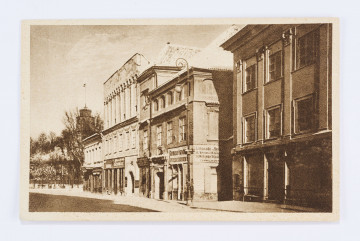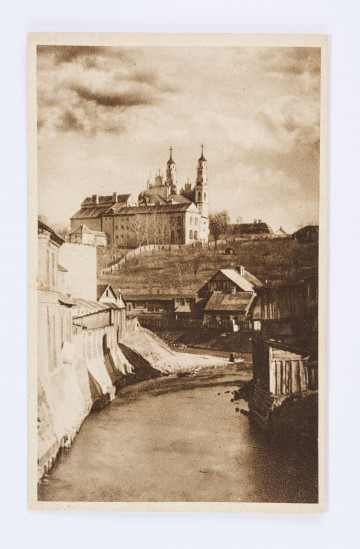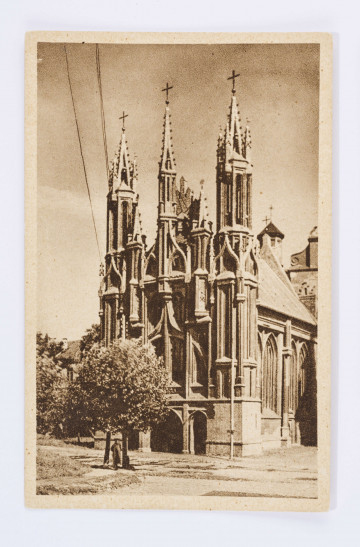
Postcard: Vilnius. View of Wielka Street and the Castle
1922 — 1939
National Museum in Lublin
Part of the collection: Photographic iconography of Lublin from 1890–1939
For a long time, the place of trade in old Lublin was the vast market between Świętoduska and Nowa Streets (today's upper section of Lubartowska Street). Świętoduska Street joined Krakowskie Przedmieście near the monastery and hospital buildings of Holy Spirit, to which it owes its name. However, it was another nearby temple that became an object often immortalised on old postcards. It was the Church of the Discalced Carmelites on the western side of Świętoduska Street.
The church, dedicated to St. Joseph the Spouse of the Blessed Virgin Mary, was built in the years 1635-1644. Monastery buildings were erected around it, absorbing the former manor house of the Bełsk voivode Rafał Leszczyński. For some time, the manor was the seat of the Calvinist congregation. Then it was acquired by the Discalced Carmelite Sisters. They entrusted work on the construction of the complex to Jakub Tremanzel. In 1807, the church and monastery became the property of the male branch of the congregation.
The Carmelite church retained the features of the Lublin Renaissance religious buildings. When, in 1906, a new attic on the bell tower and a gable over the porch were put up, designed by the Warsaw architect Stefan Szyller, they still fitted in with the original mass of the temple. At that time, part of the monastery annexes on the street side was state property. It was used as a military prison until the outbreak of World War II. The monks regained the premises only at the end of the 1980s.
Although the Carmelite complex was in time surrounded by a row of tenement houses and inn buildings, and a market with wooden and brick butcheries spread in front of it, it still stood out in the landscape of these parts of the city.
At the beginning of the 20th century a series of colourful postcards was created, showing the market at the Carmelite church from various perspectives. Particularly picturesque was a shot of the rising fragment of Świętoduska Street with the market, the body of the church and the Water Tower emerging in the distance, which does not exist today.
Author / creator
Dimensions
cały obiekt: height: 13,6 cm, width: 8,7 cm
Object type
postcard
Technique
manual script
Material
paper
Creation time / dating
Creation / finding place
Owner
The National Museum in Lublin
Identification number
Location / status

1922 — 1939
National Museum in Lublin

1922 — 1939
National Museum in Lublin

1922 — 1939
National Museum in Lublin
DISCOVER this TOPIC
Castle Museum in Łańcut
DISCOVER this PATH
Educational path